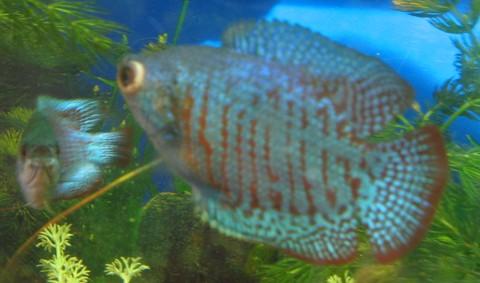Popeye in Tropical Fish

Popeye in a blue dwarf gourami.
Notice the difference between the "popeye" and the normal eyes of the unaffected fish in the background.
Popeye or exophthalmus in fish is easy to recognize because the eye protrudes from it's socket as seen in the above photograph. One or both eyes may be affected. The eye may be cloudy and in severe cases the eye may completely pop-out of the socket.
There is no single cause of popeye. Usually only one fish in a tank will be affected. Fluid build-up in or behind the eye is responsible for this condition, but there can be many different causes for the fluid build-up. Popeye often comes on suddenly. The fish can appear perfectly fine and the next time you look in the tank your fish has popeye.
It seems to be a rather rare condition. I've seen it in only two fish in over 20 years of fish keeping. I saw it occur in an angelfish that hurt itself during a courtship ritual and the only other fish I've seen with popeye is the dwarf gourami in the above photo. He developed popeye just a few days ago and I'm still hoping he'll make a full recovery.
Often, popeye stems from an injury to the eye. Bacterial infections may also be responsible, and often occur secondary to an injury. Poor water quality may also cause popeye, however, it seems that if poor water quality is to blame that you would see more fish in the same tank with this problem. Popeye can also be caused by ichthyosporidium, excess blood gases caused by nitrogen supersaturation (what divers get when they come up to the surface too quickly), eye parasites, fungal infections, viruses, and from a hormonal imbalance in the fish. If it is caused by excess blood gases you'll typically see gas bubbles in the eye and other fish may be having problems as well. Excess copper in the aquarium has been known to cause popeye in saltwater fish, but it is unknown if copper causes popeye in freshwater fish.
Popeye Treatment
Unfortunately, without knowing the causitive agent it is difficult to treat popeye. In the angelfish that developed popeye after an eye injury, treatment with Maracyn in combination with Maracyn-Two was effective and the fish made a full recovery and survived for several more years. Often, after an injury occurs in fish it becomes infected with fungus and/or bacteria and treating the infection will cure the fish.
Because you typically don't know the cause (as with the dwarf gourami in the photo), the best treatment is to do a partial water change (20-25 %). Do this as your very first step. If there are toxins in the water they will then be diluted after the water change.
If the popeye was due to a bacterial infection, I used to use the Maracyn and Maracyn-Two to treat popeye, but it seems they've stopped selling these products.
You can use tetracycline to treat popeye caused from a bacterial infection, however, be forewarned that tetracyline in your tank will cause water discoloration and a brown foam to form on your water surface.
If your fish is still eating you can also try feeding him or her antibacterial fish food. In fact, this is probably the best option to try first before treating the entire tank. It is also a good idea to put the affected fish in it's own tank if possible. Sometimes tankmates will bully an ill fish because it can't defend itself. Also by putting the ill fish in its own tank you don't have to treat the entire tank, only the sick tank. This will also help to keep any disease the fish may have from spreading to the rest of your fish.
Although Melafix is said to treat bacterial infections, I've not had much luck with Melafix for popeye. You could try Melafix and it might not hurt anything, but it may not help either. Generally, you'll need something with a stronger antibiotic action than Melafix for popeye, such as tetracycline.
To help prevent fungal infections from developing in the eye it is beneficial to add some aquarium salt to the tank (about 1 tablespoon per 5 gallons of water) and some Pimafix. I've been doing almost daily partial water changes in the gourami's tank as well.
After treating the fish the best way you can (with a partial water change, antibiotics, and possibly some aquarium salt in the water) all you can really do is wait and see and hope the fish recovers. If the fish is having endocrine problems, treatment with water changes and antibiotics will not be effective. If the problem is viral, antibiotics will also not be effective. Unfortunately, despite attempting to treat the gourami in the above photo, he did not survive.
